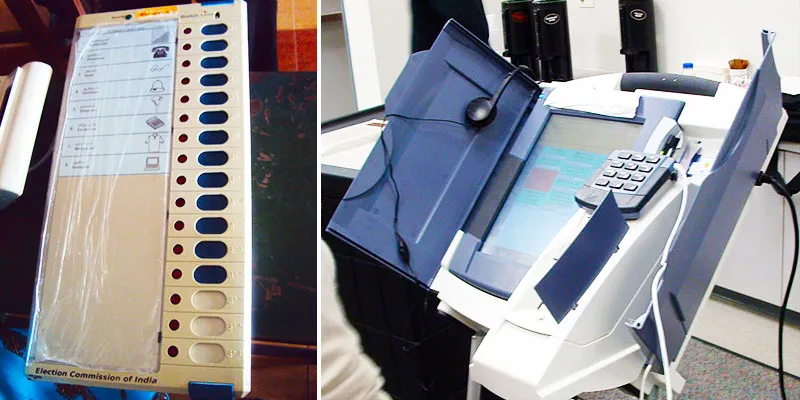To test allegations of EVM tampering, Karnataka IT minister proposes hackathon
The electronic voting machines have come under a cloud following allegations and complaints that these machines can be tampered with to favour a particular political party. An ethical hacking challenge will strengthen democracy and help rectify mistakes, if any.
In the light of questions over the alleged tampering of electronic voting machines (EVM), especially in the wake of the UP assembly elections that gave the Modi-led Bharatiya Janata Party a landslide victory, Priyank Kharge, Karnataka's Information Technology Minister, has volunteered to host an ethical hackathon.

Kharge's proposal comes in the wake of a strong demand for going back back to voting through paper ballot, or at least counting the attached voter-verified paper audit trail (VVPAT), which will eliminate any doubt.
The Election Commission of India (ECI), however, has maintained that EVMs are tamper-proof, saying that tampering is not possible as all the stakeholders, including polling agents of candidates, are involved in the process of storage, trial, mock poll and sealing of every machine.
Kharge feels all doubts can be put to rest with an ethical hacking event. He told YourStory,
“I am willing to host such a hackathon. Bengaluru is full of ethical hackers, and if anyone can prove that EVMs can be hacked, it is good for strengthening our nation’s faith in democracy.”
It’s a week since he tweeted his wish to host such a hackathon, but neither the ECI nor the two public sector companies that manufacture the machines—Bengaluru-based Bharat Electronics nor Hyderabad-based Electronics Corporation of India—have responded.
Meanwhile, several WhatsApp groups have been formed across the country demanding manual counting of VVPAT machines for the just-concluded bypolls in several states for various Assembly and Lok Sabha seats. One such group in Bengaluru, 'We want VVPAT By election', started by neurosurgeon Banu Prakash has been throwing light on the vulnerability of the EVMs.
“The ECI has currently not made it mandatory to count the votes printed on a paper roll by a VVPAT machine attached to the EVM unit before announcing the results. Such a gesture will eliminate doubts,” the doctor, who contested the municipal polls, said.
The VVPAT is a unit attached to the EVM which, for a few seconds, allows the voter to see in secrecy whether the button they pressed in favour of the candidate is the one that the EVM recorded.
Kharge feels that ethical hacking or a public demonstration of the vulnerabilities of an EVM is the only way out and has even volunteered to host the challenge. The ECI or the manufacturer has to rise to the occasion and come forward with a few old and new machines so that hackers can choose randomly from them, he says.
There are three models of EVMs in use: pre-2006 machines, those made between 2006 and 2013 (these form the bulk of those in use), and those manufactured after 2013. A VVPAT unit can be attached to all the three models enabling the ECI to print every vote cast. But if these are counted individually, then the secrecy of the voter’s choice will be violated, as the candidate can exactly pinpoint how many favoured them at which booth, and how many voted for the opposition.
This practice was done away with two decades ago, and mixing of votes was introduced to eliminate post-poll voter intimidation, former Chief Election Commissioner SY Quraishi had said in his media interaction following the Uttar Pradesh Assembly results.
Immediately after the UP polls results brought the BJP to power with a resounding mandate, former UP chief minister and Bahujan Samaj Party’s leader Mayawati raised the issue of EVM tampering, and alleged that the EVMs were rigged in favour of the BJP. Soon after in Bhind, Madhya Pradesh, during the testing of machines, there was suggestive evidence that the VVPAT machines showed votes cast in favour of BJP's Lotus symbol even when the mock votes were cast in favour of non-BJP candidates.
The ECI had explained away this anomaly as a one-off malfunctioning incident and dismissed the EVM as a defective one.
Kharge asks,
Unless we doubt, we cannot innovate. The choices of a billion people are at stake multiple times as we use EVMs, from panchayat to Lok Sabha polls. It is my aim to dispel doubts. It is not right on the part of the ECI to ask losing political parties to introspect on results. Why is an autonomous institution becoming political?
A few years ago, when an ethical hacker demonstrated at a press conference that EVMs can be tampered with, the Mumbai police arrested the hacker for allegedly stealing an EVM, which they claimed was government property.
Many political parties and activists view the ECI’s procedure of checks and balances as being secretive and authoritative.
Activists have hailed Kharge's call for a hackathon. “Such a hackathon would help restore faith in both the ECI and democracy. It is a very good opportunity to dispel doubts. It is also an opportunity to rectify mistakes,” says Dr Prakash.







